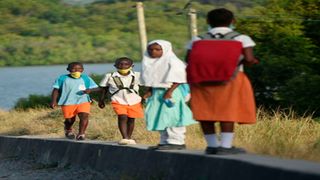
Children returning home from school. While Omicron is more contagious than previous variants, children who are vaccinated have a major advantage.
| File | Nation Media GroupNews
Premium
What to do to keep children safe from Omicron as schools reopen
As schools reopen this week, parents are worried about the safety of their children given that Omicron, the new Covid-19 variant, is spreading in the community and pushing up infections.
Other countries are witnessing a spike in hospital admissions of children because of the variant, with many wondering if it is safe for them to report back to school.
Data from the Ministry of Health shows that more children are being infected in the current wave compared with previous ones.
Over the past one week, more than 500 children have been infected compared with the last (fourth) wave, when about 124 got the virus.
“We are not saying that the number is huge, because other age groups are recording higher numbers, but comparing this wave with the last one given that we are seeing the children, the numbers are higher,” says Dr Walter Otieno, a Western Kenya-based paediatrician.
Dr Otieno, a lecturer at the Maseno School of Medicine’s Department of Paediatrics and Child Health, also noted that despite the high numbers of cases, they are less severe.
“Many could be testing positive, yes, but we are not recording many deaths and admissions in intensive care units in the said populations,” he said.
Dr Otieno talked to the Nation to answer some of the critical questions posed by parents in school media.
Is there a need for teachers to also show proof that they are fully vaccinated now that schools are reopening?
(Omicron) is very transmittable and also infects those who are already fully immunized, though the severity is low. Teachers need to be fully vaccinated for them to resume in-person learning in schools.
He also urged the Ministry of Health to ensure that schools take safety precautions and that classrooms are properly ventilated.
“Where necessary, windows should all remain open … and open places set up for kids to wash their hands,” he said.
Some schools in the US, the UK and South Africa, especially those in areas recording high transmissions, are delaying reopening until the situation is contained.
But Dr Otieno said the virus is here and given that Omicron is infectious but less pathogenic, learning must continue.
“They lost a lot of time the last time schools were closed for almost a year. We should have them back in classes but ensure they observe the protocols, starting with the teachers themselves,” he said.
Should students be tested before coming back to school?
Omicron might show itself days after the test, he said, and so it is not necessary to have a negative test before they return to their classrooms.
The ministry, he said, needs to support schools to put in place the necessary measures.
“The number of students in the country is huge and with this approach, it might not be easy for some parents, who have to cough up the testing fee (on top of paying) school fees,” he said.
Should children aged 15 and above be vaccinated?
“Definitely yes. Studies have shown that vaccines reduce the severity of this virus, and who knows what kind of variant we will have in the future. The virus is mutating and we could have a worse or a mild variant,” he said.
Different variants have different presentations, he said.
“If the vaccine is available and the government has given clearance that children 15 years old and above can be vaccinated, why not, let’s have our children protected,” Dr Otieno said.
While Omicron is more contagious than previous variants, he said, children who are vaccinated have a major advantage.
The government has rolled out a vaccination plan that will see teenagers 15 years old and above vaccinated specifically with the Pfizer vaccine. But the World Health Organization recommends starting at age 12.
Health Cabinet Secretary Mutahi Kagwe noted that Pfizer is the only vaccine approved by WHO for the younger population.
"In view of the emergency use authorisation by the Pharmacy and Poisons Board and following the WHO recommendation, I direct that we open vaccination of young people 15 years and above with Pfizer. The estimated population of this group is … 5.7 million," Mr Kagwe said.
Now that (children) have access to vaccines, it is good that they are vaccinated, said Dr James Campbell, a professor of paediatrics and paediatric infectious diseases at the University of Maryland in the US.
“In the past, they didn't have access to a vaccine but now there are enough and even studies have been done in the populations that have found that vaccines are safe and reduce the risks of being hospitalised,” he said.
Should students wear face masks in school and classrooms?
It has been proved that masks offer protection, Dr Otieno said, and whether vaccinated or not, they should always put on their masks in public crowded places including schools.
“With the mutation of the virus, your mask, when won properly, is definitely going to protect you. Reducing infection is critical to help prevent new variants that could prolong the pandemic further,” Dr Otieno advised.
What kinds of masks should kids be wearing now?
Dr Otieno urged parents to buy three-ply surgical masks with an adjustable nose wire and KN95 masks, which he said were more helpful though expensive.
“With manufacturers now producing three-ply masks for children, this is the best mask and not the cloth one… This is one of the best preventive measures,” he said.
He also advised that schools avoid activities that bring crowds such as sports events and even physical education activities.




